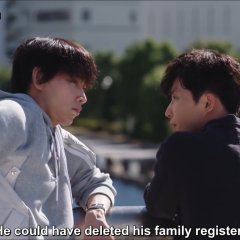 Kikazaru Koi niha Riyuu ga Atte: A Reason for Love
Kikazaru Koi niha Riyuu ga Atte: A Reason for Love Kazumi Shima entra para uma unidade móvel de investigação e começa a trabalhar com um policial Ai Ibuk, que tem um passado complicado. (Fonte: Netflix) Editar Tradução
- Português (Portugal)
- Arabic
- Русский
- Français
- Título original: MIU404
- Também conhecido como: Mobile Investigative Unit 404 , Unidade Móvel de Investigação 404 , UMI 404 , MIU 404
- Roteirista: Nogi Akiko
- Diretor: Tsukahara Ayuko, Takemura Kentaro, Kato Naoki
- Gêneros: Mistério, Comédia
Onde assistir MIU404
Subscription (sub)
Elenco e Créditos
- Ayano GoIbuki AiPapel Principal
- Hoshino GenShima KazumiPapel Principal
- Mizukami KoshiKokonoe Yohito [MIU member]Papel Secundário
- Hashimoto JunJinba Kouhei [MIU member]Papel Secundário
- Aso KumikoKikyo Yuzuru [MIU captain]Papel Secundário
- Kanai YutaItomaki Takashi [MIU member]Papel Secundário
Resenhas

Like UNNATURAL, MIU404 takes a social commentary approach to the traditional police procedural / crime dramas. The first few episodes are seemingly disconnected in storyline (ie. each episode has its own crime to solve), but as the story goes on you'll see how the bigger picture connects. There's more at stake than what meets the eye. And the plot and acting all play critical roles in conveying that to the audience.
I particularly enjoyed the lines said by the MIU captain. I think the scriptwriter really made good use of the character to bring out her worldview and her morals/ethics. The amazing storyline aside, MIU404 is essentially Nogi Akiko's letter of complaint about the current police hierarchy, how the Japanese society treats juvenile crimes, as well as the problems with fake news and internet trolling... and I love it.
Esta resenha foi útil para você?
Well-written police procedural
This script has everything - good humour, interesting exploration of humanity and justice, excellent character development, solid chemistry between characters, and a mesmerising villain to top it off.The earlier cases may come off as small and insignificant. Unlike most police procedurals, only a handful of cases revolve around a murder - some are probably just misdemeanours. What's interesting in these earlier episodes is that there are clues, characters and concepts dropped in which feature in a more significant way later on. I think that's the appeal about this whole series, because the fact that things that occurred in an earlier episode have a bearing later on makes these characters' lives feel real and present.
There's a lot I can say about the story, from the very nuanced depictions of not just the main characters but also of their female boss, who's probably one of the most convincing and well-rounded female police bosses written in Japanese TV. It's also full of ideas that's worth further exploring on a rewatch, like the idea of smaller crimes not being insignificant, the lack of (and urgent need for) an appropriate witness protection program, the prejudice against migrant workers (which is applicable to most developed countries), the dangers of internet vigilantism (and how apt it was to get Suda Masaki to do this role after "Class 3A"), or how fragile and vulnerable justice is, even for people who society expects to uphold justice.
Suda Masaki is a scene stealer, and his portrayal of the insolent and enigmatic Kuzumi makes him one of the best villains to come out of this genre (I don't think that's a spoiler since in his first appearance he shows an underage kid a drug). It will be such a shame not to have a second season of this.
Esta resenha foi útil para você?






















































